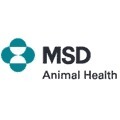 MSD Animal Health (known as Merck Animal Health in the USA and Canada) will present results from more than 20 studies at the 6th European Symposium of Porcine Health Management in Sorrento, Italy from May 7-9, 2014. The studies are mainly focused on Porcine Reproductive and Respiratory Syndrome (PRRS), Porcine Circovirus type 2 (PCV2) and Reproduction Health Management.
MSD Animal Health (known as Merck Animal Health in the USA and Canada) will present results from more than 20 studies at the 6th European Symposium of Porcine Health Management in Sorrento, Italy from May 7-9, 2014. The studies are mainly focused on Porcine Reproductive and Respiratory Syndrome (PRRS), Porcine Circovirus type 2 (PCV2) and Reproduction Health Management.
“MSD Animal Health, through our commitment to the Science of Healthier Animals™, is dedicated to providing veterinarians and pig producers with comprehensive solutions to manage the health of their herds,” said Narciso Bento, Global Swine Business MSD Animal Health. “At ESPHM, we are pleased to share new state-of-the-art data that will help veterinarians and producers be more efficient and improve the management of the most serious and costly problems and diseases affecting pigs today.”
Abstracts selected for oral and poster presentations are as follows:
Oral Presentation:
Reproduction
- Return on investment of fixed time insemination (Thursday, May 8; 16:45-17:00)
Poster Presentations:
Viral Diseases

- Case report of a PRRSV infection via semen and clinical signs in PRRSV vaccinated and unvaccinated herds (P69)
- Efficacy of piglet’s PRRS vaccination to reduce viral transmission in the nursery (P71)
- Characterization of the humoral immune response elicited by vaccination with PORCILIS® PRRS administered by different routes (P72)
- Control of PCV2 subclinical infection: ROI comparison of 2 one dose vaccines in a highhealth status pig herd (P74)
Herd Health Management
- Effects of management strategies on abortion episodes and PRRSV circulation in an endemically infected breeding farm (P96)
- Evaluation of pig performance and lung lesions score in the slaughterhouse of pigs vaccinated with M+PAC or competitor vaccine (P98)
- Impact of vaccination with a modified live PRRS vaccine in a continuous flow weaner to finisher unit in the UK (P105)
- Study on the relationship between seroprevalence of Ascaris suum in fatteners, farm management factors and production parameters (P108)
- Comparative clinical study of PORCILIS M Hyo ID Once, an intradermal Mycoplasma hyopneumoniae (M. h.) vaccine, versus Suvaxyn® M.Hyo Mono (P117)
- Comparative clinical study of PORCILIS M Hyo ID Once, an intradermal Mycoplasma hyopneumoniae (M. h.) vaccine, versus Stellamune® Mono (P118)
- Comparative clinical study of PORCILIS M Hyo ID Once, an intradermal Mycoplasma hyopneumoniae (M. h.) vaccine, versus Ingelvac® M. Hyo (P119)
- Prevalence of nematodes in loose housed industrialized sows from a pig practice in Funen, Denmark (P40)
Bacterial Diseases
- Use of ResPig™ to monitor efficacy of different vaccination strategies to control mycoplasma hyopneumonia infection (P167)
- Practical approach of upper respiratory tract problems of weaned piglets and the effect of passive Atrophic Rhinitis (AR) immunization on clinical symptoms and antibiotic use (P178)
- Safety of the intradermal vaccination against Mycoplasma hyopneumoniae using the needle-free IDAL device (P186)
- Gilts and sows PCV2 re-vaccination at mating increases the homogeneity and the titres of antibodies at farrowing and the passive transfer to the piglets, but does not affect the frequency of IFN-y secreting cells (P215)
Immunology and Vaccinology
- Intradermal vaccination of piglets against Mycoplasma hyopneumoniae with the needlefree IDAL device; clinical evaluation (P217)
- Control of pneumonia in a finishing farm following two different Mycoplasma hyopneumonia vaccination strategies (P187)
Reproduction
- A case report of single dose fixed time insemination (P237)
- Effective treatment of polycystic ovarian degeneration in gilts and sows with Altrenogest (REGUMATE®) – First results (P239)
- Single fixed time insemination in multiparous sows with an injection of gonadotropinreleasing hormone agonist (RECEPTAL®) (P240)
- The effect of correct gilt management on reproduction parameters (P241)
- A single fixed time insemination following ovulation induction allows successful breeding of gilts and sows (P245)
April 30, 2014 - MSD


